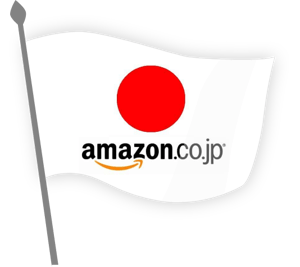Originally published on July 13, 2023, updated January 20, 2025
Menu
Join Our Email List
- Receive our monthly newsletter.
- Stay up to date on Amazon policies.
- Get tips to grow your business.
Amazon Japan is the gateway to the Asia-Pacific. But there are some roadblocks you must overcome to start selling in Japan. In this guest article, AMZ Advisers shares more about how to sell on Amazon Japan.
For those of you selling internationally, Amazon Japan may be a lucrative expansion opportunity worth exploring. The best part? You can effortlessly link your American or European account for a hassle-free expansion.
However, there are possible roadblocks that you may have to overcome before you can start listing your inventory for sale.
There are many benefits to selling on Amazon Japan.
 Amazon Japan is the leading online retailer in the Asia-Pacific, receiving 624 million visits in December 2022 alone. By selling here, you’ll increase brand awareness, reach more sales goals, and target one of the most influential countries in the world.
Amazon Japan is the leading online retailer in the Asia-Pacific, receiving 624 million visits in December 2022 alone. By selling here, you’ll increase brand awareness, reach more sales goals, and target one of the most influential countries in the world.
For eCommerce companies seeking global success, tapping into Japan's Amazon marketplace is a crucial move. But this is only the tip of the iceberg. Here's what else you need to know.
In 2022, Japan took third place in the world’s GDP (gross domestic product) rankings. Their GDP was 4.23 trillion US dollars, illustrating just how much buying power Japanese consumers have.
Not only that, but online consumerism in Japan keeps growing. In 2022, their eCommerce market grew by 6.9%, meaning more and more customers want to purchase products online.
This isn’t the only reason to sell in Japan. Japanese consumers are incredibly loyal to brands, especially the older generation. Younger buyers embrace innovation and want to use the newest products. It’s also important to offer convenient and fast delivery options to compete with Japanese household brands.
Language barriers are a common concern businesses have when expanding to any country. Fortunately, you don’t need to speak Japanese yourself - you can try using Amazon's translation tools or external language translation services. Keep in mind that it's crucial for international sellers to prioritize language localization as it can greatly impact their discoverability on Amazon Japan. Neglecting this aspect may result in missing out on valuable keywords that could potentially boost your visibility and sales.
Additionally, anywhere from 15-37 million people in Japan possess a level of proficiency in the English language. In the event that certain components of your marketing materials prove challenging to translate, for instance, multimedia content like images and videos, providing them in English can still effectively generate leads.
Finally, what about customer support? Amazon offers support in multiple languages, including Japanese. If you choose Amazon FBA in Japan, you can let Amazon handle sales, customer service, and returns.
Learn more: Amazon Global Selling: Expanding to Japan
While there are many benefits of selling products in Japan, you'll also have to overcome some roadblocks. Many of them are the same ones you would find in other countries, such as taxes. However, Japan also has different regulations than other nations, such as product standards.
As with many other countries, Japan has taxes, duty rates, and other fees when importing goods from another country. Fortunately, their import tax system is similar to the US.
Japan imposes taxes based on freight value. While the country does impose higher rates on certain goods, such as agricultural products, some items aren’t even subject to import taxes, such as non-electrical machinery.
Their duty rate is also among one of the lowest in the world – most businesses only pay a 4.3% rate for imported goods. You may have to pay a consumption tax when importing goods into Japan. That rate is between 8-10%.
And, as of October 1, 2023, businesses must submit an invoice that details their tax payments.
Taxes can be difficult to handle, but you don’t have to go about it alone. Amazon has a network of Japanese tax experts, and you can receive a discounted rate when working with any of these professionals. You can find Japanese tax experts on Amazon’s Solution Provider Network.
Japan has marketing compliance and safety regulations that are different from other countries.
While Japan doesn’t have strict standards for ad targeting and behavioral advertising, there are some marketing and product labeling tactics to avoid.
First, there are limitations on contests and sweepstakes. Japan’s Act Against Unjustifiable Premiums and Misleading Representations (AUPMR) prohibits deceptive advertising, false product labeling, and misleading customers to think that the product quality is better than it is.
Japan has many product safety laws and regulations that sellers must abide by. As with many countries, Japan participates in the International Electrotechnical Commission (IEC) and International Organization for Standardization (ISO). But Japan also has its own product safety legislation.
Depending on what products you sell, you may be required to have a Japanese Industrial Standards (JIS) certification. This certification mainly applies to mineral and industrial products but is also required for other industries, such as automotive engineering and medical equipment.
Japan also has strict requirements for agricultural and food products. You can visit Japan’s Ministry of Agriculture, Forestry, and Fisheries (MAFF) website for more information.
Lastly, Amazon Japan also has restrictions on certain products. While this list isn’t as extensive as the ones in other countries, there are some products you can sell in the US that you can’t on Amazon Japan. This includes:
As you can see, it's vital that you know how to sell to Japan before you get started or you may run into many problems along the way.
 As in other regions, sellers can store and ship their products themselves. There are many fulfillment services in Japan that offer warehousing, shipping and delivery, and customer service.
As in other regions, sellers can store and ship their products themselves. There are many fulfillment services in Japan that offer warehousing, shipping and delivery, and customer service.
This way, you can still sell products in Japan without having a physical presence in the country.
However, many businesses also use Amazon FBA in Japan. Amazon will store your products while handling packing, shipping, and returns. All you have to do is send your products to the FBA location in Japan, and Amazon will handle the rest for you.
Are you ready to begin your Japanese marketplace expansion? Here's a quick summary of how to sell on Amazon Japan:
Amazon has a massive presence in Japan. If you own an international eCommerce business and want to expand to the Asia-Pacific, you should take advantage of Amazon Japan. The experts at AMZ Advisers are ready to help!
Originally published on July 13, 2023, updated January 20, 2025
This post is accurate as of the date of publication. Some features and information may have changed due to product updates or Amazon policy changes.
These Stories on International
14321 Winter Breeze Drive
Suite 121 Midlothian, VA 23113
Call us: 800-757-6840





Copyright© 2007-2025 eComEngine, LLC. All Rights Reserved. eComEngine®, FeedbackFive®, RestockPro®, and SellerPulse® are trademarks or registered trademarks of eComEngine, LLC. Amazon's trademark is used under license from Amazon.com, Inc. or its affiliates.
No Comments Yet
Let us know what you think